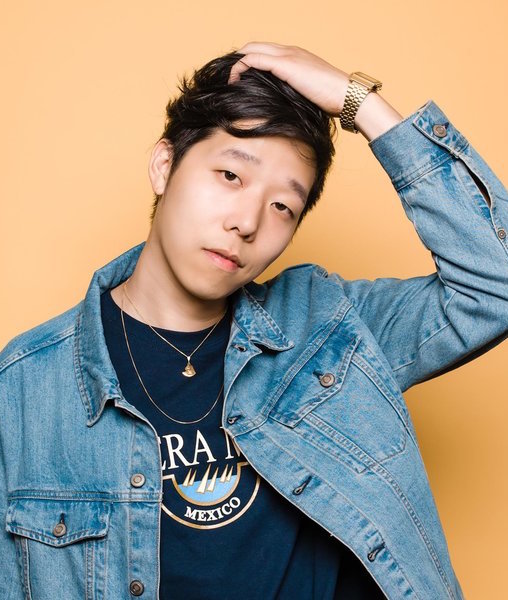What started out as bedroom samples and remixes out of his UC Berkeley dorm room has turned Charlie Yin into one of the fastest-rising electronic music producers and DJs of today.
As Giraffage, Yin has toured with the likes of Orlando producer XXYYXX, supported electronic rock duo Phantogram across the U.S. and even performed as the main support for Porter Robinson’s North American “Worlds” tour in 2014. His feel-good ambient pop instrumentals infused with atmospheric hip-hop beats, synths and dicey vocals landed him record deals with Fool’s Gold and Dim Mak; he’s currently signed with Counter Records (home to artists like ODESZA and RAC).
The San Jose, California-based artist, who says he is more comfortable making music in his bedroom than being on the road, recently released his latest record “Too Real,” inspired by modern electronic music and sounds of the ’80s.
Yin spoke to Kore ahead of his Los Angeles tour date on Nov. 29.
I want to dive into your album “Too Real,” which took you two years to make. What kind of headspace were you in when you approached this record?
I was listening to a lot of older music, a lot of music from my childhood and ’80s stuff. I really liked the idea of merging those sounds and chord progressions with modern sounds, so I think that was kind of the main idea behind this album: the marriage between past and present.
The first single that I released, “Slowly,” was the first song that I wrote for the album, and it took me a really long time to reach that point where I had a song that I knew would be on the album. After I wrote that song, it informed the rest of my album [and] was the clear indicator of the direction I wanted to take my album.
You did a collaboration with Japanese Breakfast on “Maybes.” How do you generally approach working with other musicians?
For me, it’s kind of weird collaborating with other people just because “Giraffage” has always been a solo pursuit. I opened myself up more to collaboration with this album, and the way these tracks came about were all through the internet. I don’t think I ever met up with a single person to actually record a vocal for the album.
One of my favorite artists growing up was The Postal Service, and [that was kind of] how they did their album too — sending sounds back and forth and acapella. I really like that approach and tried to do that for this album.
Tell me about growing up in the Bay Area, going to Berkeley and how you started making music and taking it more seriously as a possible career.
I’ve always been making music throughout my teenage years. I was in bands throughout high school and early college, so when I was going to Berkeley, I pretty much spent most of my free time in my dorm room writing songs. I would skip class just to write and finish songs. As a student, I definitely wasn’t the best. I was studying political economy and I honestly forgot everything that I learned. Luckily my music was getting a lot of attention by the time I graduated so I was able to segue straight into doing music full-time.
Your album feels very house and loungey, different from a lot of electronic music today. Was that kind of in your conscience to have that vibe coming from your album?
I enjoy a wide variety of genres and I really like pop music, so I think this album was kind of my weird attempt at making odd music — incorporating vocals and adhering to more traditional song structures and whatnot.
What is your general creative process when you go into the studio to record?
I would say most of [my] time is spent consuming other art, or listening to other music. I feel like your output is only as good as your input. So 95 percent of the time, I’m not working on music and just consuming other forms of art. The other 5 percent of the time, I’m in my software putting together melodies and chord progressions that were influenced by whatever art or surrounding or environment that I’m influenced by.
How do you feel about being Asian American in the music industry?
It’s cool that the Giraffage project has gone as far as it’s gone. I think it’s just important to have heroes that look like you. Growing up, my favorite band was Thrice, probably because one of their guitarists is Asian. I learned Thrice songs on the guitar and bought a guitar that looked exactly like [Teppei Teranishi’s]. He just made me more confident that maybe I can pursue music and could be at the level that he is at, versus if there was no one that looked like me, I’d probably have no confidence [and think] that’d never happen.
It’s cool to think that somewhere out there, there’s a young Asian person who can see me doing music and would give them more power and confidence to make music themselves. We’re still somewhat of a rarity, but there’s definitely way more Asians in the spotlight than there were even five years ago. I’m hoping to push Asians to have the confidence to pursue more creative endeavors such as music, design and art instead of traditional roles like doctors, programmers and engineers.
Do you have any words of advice for other artists?
I would just say make music for yourself and don’t really worry about what other people think and how they perceive your art. I feel the best art is made in a pure space, and you have to make it for yourself before others can even start to enjoy it.
What can we look forward to from you in the near future?
I have this [current fall] tour and another tour in Europe. I’m doing a bunch of festivals in the new year, so I’m going to be on the road for pretty much all of next year. But I do want to start some side projects [and] make music that I haven’t really explored. I want to put together a band and make guitar-oriented music.
Giraffage is currently on tour with Filipino American electronic music producer Sweater Beats. You can catch them live at The Fonda Theatre in Los Angeles on Wednesday, Nov. 29.
Follow Giraffage on Facebook, Twitter, YouTube, SoundCloud, Instagram and his website at giraffage.com.







